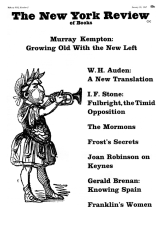In response to:
Heller High Prices from the December 29, 1966 issue
To the Editors:
In his review of Walter Heller’s New Dimensions of Political Economy, Mr. George Stigler dismisses a third of the book with one sentence, his concluding sentence, with the capricious and altogether incorrect explanation that it is “wholly unrelated to either the new economics or recent public policy.” His reference is to the Heller plan which calls for grants of surplus federal revenue to the states. The facts are that this plan is integrally related to “the new economics” and that it is a central concern of recent public policy. An essential element in the new economics, as Heller makes clear in his book, is that its prime objective is to prevent fiscal drag, that is, the negative effect of accumulating surplus revenues at the federal level. Fiscal drag can occur because at existing tax and growth rates there is now an automatic growth in federal revenues of about $7 billion yearly. For the new economics to work, we must “declare the fiscal dividend,” in Heller’s words, that is, spend it (usefully, we hope) or the dividend will not continue to develop. For the economy would then slow down under fiscal drag. The Heller plan (or more correctly, the Heller-Joseph Pechman of Brookings Institution plan) is responsive to this fact and to the fact that the states and localities have relatively inelastic tax revenues (mostly from property, sales, excise taxes) but have become overwhelmed with burgeoning urban problems, problems like education, health, transport, that are traditionally state and local responsibilities but which now increasingly involve national interests.
The Heller plan has been in the center of recent public policy debates because the Republican Congressional leadership has taken the initiative (with the support of the Governors) to endorse the plan as the number one measure they will fight for in the upcoming struggle over the question of federal grants. To the dismay of many of us, it is the conservatives who are endeavoring to take over the plan so as to combat President Johnson’s “creative federalism.” They wish to use the plan to circumvent Washington by ensuring that grants to the states under the plan are wholly unconditional (not Heller’s desire). Many who would otherwise favor the Heller plan accordingly are now fearful that it can be exploited in a way to perpetuate failed state policies by inept bureaucrats.
In any event, the Heller plan properly viewed is seen to be a crucial component of the new economics and at the heart of recent major public policy considerations.
Edward T. Chase
New York City
George Stigler replies:
Mr. Chase complains that I put aside Heller’s proposal of a system of federal grants to the states. I reaffirm the irrelevance of this proposal to the new economics: the “fiscal drag” of too rapidly rising federal tax revenues can be solved by returning some of the funds to the taxpayers as well as by returning the excess funds to local governments. The proposal is not yet near legislation so Mr. Chase is stretching things to hail it as a “central concern” of recent (or even imminent) policy. I do not deny the desirability of a close and even favorable analysis of a system of federal grants; I do deny that the analysis has to be made by a reviewer of Mr. Heller’s book.
This Issue
January 26, 1967



